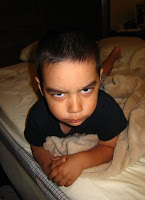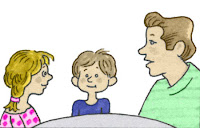Ask - Don't Tell: Tips for Parents with Defiant Children

Autonomy carried to its extreme gives rise to defiant behavior where a child refuses to be controlled by anybody. Parents often get locked in conflict cycles with such children. Defiant behavior is developmentally appropriate at three stages in a child’s life: age 2 - when the youngster is going from infancy to childhood puberty - when the young person is going from childhood to adulthood old age - when the individual is going from self-sufficient adulthood to needing supportive care What is similar about these developmental stages is that each is a time of intense transition when the person feels "out of control" regarding his or her circumstances. Some people get stuck in a defiant stage. This type of behavior is especially strong when teenagers feel that they have no control over a life situation (e.g., divorce, separation, moving, death, change in school, etc.). The reaction is to fight for control. Parents need to recognize that any child can exhibit defi...





